人教版七年级英语下册:第十一单元短语语法归纳练习
人教版七年级英语下册:第十一单元短语语法归纳练习(含答案)
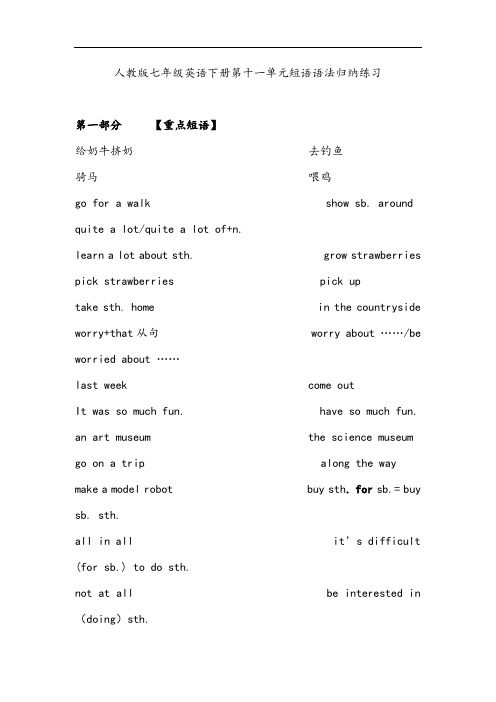
人教版七年级英语下册第十一单元短语语法归纳练习第一部分【重点短语】给奶牛挤奶去钓鱼骑马喂鸡go for a walk show sb. aroundquite a lot/quite a lot of+n.learn a lot about sth. grow strawberriespick strawberries pick uptake sth. home in the countrysideworry+that从句 worry about ……/beworried about ……last week come out It was so much fun. have so much fun. an art museum the science museumgo on a trip along the waymake a model robot buy sth. for sb.= buysb. sth.all in all it’s difficult(for sb.) to do sth.not at all be interested in(doing)sth.【答案】从左至右:milk a cow; go fishing; ride a horse; feed chickens; 去散步=take a walk;带领某人参观;相当多的;关于…学到很多;种草莓;摘草莓;捡起/接某人;带…回家; 在农村;担心……; 担心某人某事;上周;出来/出版/开花;如此有趣;玩得非常开心;一个艺术博物馆;科学博物馆;去旅行;沿途;制作一个机器人模型;为某人买某物;总之;对某人来说做某事很困难;根本不/一点也不;对(做)…感兴趣第二部分【重点语法】一、一般过去时1.定义一般过去时表示过去某个时间或一段时间内发生的动作或状态;也可表示过去经常或反复发生的动作。
e.g.I got up at 7:00 yesterday. 我昨天7点起床。
Unit 11 How was your school trip_知识清单及练习(无答案)
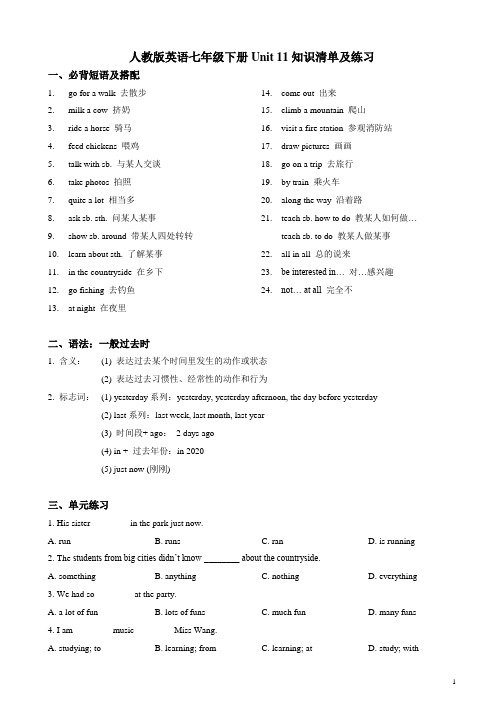
人教版英语七年级下册Unit 11知识清单及练习一、必背短语及搭配1.go for a walk 去散步k a cow 挤奶3.ride a horse 骑马4.feed chickens 喂鸡5.talk with sb. 与某人交谈6.take photos 拍照7.quite a lot 相当多8.ask sb. sth. 问某人某事9.show sb. around 带某人四处转转10.learn about sth. 了解某事11.in the countryside 在乡下12.go fishing 去钓鱼13.at night 在夜里e out 出来15.climb a mountain 爬山16.visit a fire station 参观消防站17.draw pictures 画画18.go on a trip 去旅行19.by train 乘火车20.along the way 沿着路21.teach sb. how to do 教某人如何做…teach sb. to do 教某人做某事22.all in all 总的说来23.be interested in… 对…感兴趣24.not… at all 完全不二、语法:一般过去时1. 含义:(1) 表达过去某个时间里发生的动作或状态(2) 表达过去习惯性、经常性的动作和行为2. 标志词:(1) yesterday系列:yesterday, yesterday afternoon, the day before yesterday(2) last系列:last week, last month, last year(3) 时间段+ ago:2 days ago(4) in + 过去年份:in 2020(5) just now (刚刚)三、单元练习1. His sister ________ in the park just now.A. runB. runsC. ranD. is running2. The students from big cities didn’t know ________ about the countryside.A. somethingB. anythingC. nothingD. everything3. We had so ________ at the party.A. a lot of funB. lots of funsC. much funD. many funs4. I am ________ music ________ Miss Wang.A. studying; toB. learning; fromC. learning; atD. study; with5. When my parents ________ young, there ________ not so much food.A. are; isB. were; wasC. are; wasD. were; is6. — I called you yesterday evening, but you were not in. — Sorry, I ________ in the shop with my mother.A. amB. will beC. wasD. were7. —Look! What’s on the floor?—Oh, it’s my bag. Please ________ for me.A. pick up itB. pick it upC. pick it outD. pick out it8. At about two o’clock yesterday, it ________ very cloudy and we ________ it would rain.A. gets; worriedB. got; worriedC. gets; worryD. got; worry9. — What do you want to be ________? — An English teacher.A. in the futureB. on the futureC. in futureD. at the future10. — Was there ________ when you went out with Tony? — No. I think everything was boring.A. interesting anythingB. somebody interestingC. interesting somethingD. anything interesting11. What did you do ________ your school trip?A. onB. atC. inD. with12. —It’s important for us to know ________ all the subjects.— Yeah, group work is my favorite.A. how to studyB. when to studyC. which to studyD. what to study13. After lunch they ________ to the fruit shop where they ________ some apples and bananas.A. go; boughtB. goes; buyC. went; buyD. went; bought14. He was not at home ________.A. last nightB. tomorrowC. nowD. today15. — Hi, Diana. How was your summer holiday? — ________! I enjoyed myself by the sea very much.A. Good ideaB. Wait a minuteC. That’s too badD. Pretty good16. Lucy is ________ girl. Everyone likes her very much.A. a quite beautifulB. quite beautiful aC. quite a beautifulD. beautiful quite a17. Gina played ping-pong ________.A. next SundayB. every eveningC. last weekendD. now18. She ________ that boy very much because he is a ________ boy.A. loves; lovelyB. loving; lovingC. lovely; lovedD. loved; loves19. —Don’t ________. We still have an hour to finish it.— OK.A. knowB. worryC. thinkD. say20. It ________ rainy yesterday, but it ________ sunny today.A. is; isB. was; wasC. is; wasD. was; is21. Listen! I hear someone ________ in the classroom.A. singB. singingC. to singD. sang22. He is ________ young to do the hard work.A. veryB. tooC. soD. quite23. The girl enjoys ________ the radio very much.A. listeningB. to listenC. listening toD. to listen to24. The teacher ________ me ________ this school yesterday.A. showed; aroundB. showed; atC. shows; aroundD. shows; at25. — What about going to the countryside for a trip? — ________A. it was excellent!B. Lucky you.C. Sounds great!D. Sure, I’d love to.26. It was ________ exciting race. And we all enjoyed it.A. theB. anC. /D. a27. Jack didn’t ________ at home yesterday morning.A. ate anythingB. eat anythingC. ate everythingD. eat everything28. Excuse me. I couldn’t ________ you. Could you say it again?A. findB. callC. seeD. hear29. This story is very ________, so we are all ________ in it.A. interesting; interestedB. interesting; interestingC. interested; interestingD. interested; interested30. — ________ was the book sale in your school library last Sunday? — Great.A. WhenB. HowC. WhereD. What31. My cousin ________ fishing every day when he was in the countryside last year.A. goesB. goC. wentD. is going32. This math problem is so difficult. I really don’t know ________.A. what doingB. what to do itC. how doingD. how to do it33. — Did he play basketball after school yesterday? — ________. He played soccer.A. Yes, he didB. No, he didn’tC. Yes, he doesD. No, he doesn’t34. This is a ________ train. It stops at a lot of places.A. quietB. slowC. scaryD. dirty35. What about going ________ with us?A. fishB. fishesC. fishedD. fishing36. It ________ rainy last Sunday, so Jim ________ TV at home.A. is; watchedB. was; watchedC. was; watchD. is; watch37. — Do you like Sanya? —Yeah. It’s ________ beautiful place.A. quite aB. a quiteC. quite anD. an quite38. Mike, can you show us ________ your school now?A. ofB. toC. aroundD. along39. — Excuse me, look at the sign (指示牌) “No Swimming”!— Sorry. I ________ it.A. sawB. seeC. didn’t seeD. don’t see40. — Were there any zoos in the village? — ________.A. Yes, there wasB. No, they weren’tC. No, I didn’tD. Yes, I do41. — Did you go to the movies last night? — ________.A. Yes, I wasB. Sorry, I can’tC. No, I didn’tD. Yes, I do42. Tom went into the room, took off his coat and ________ down on a sofa.A. would sitB. was sittingC. satD. had sat43. Mary ________ with her friends last Sunday night.A. took a walkB. take a restC. took outD. take pictures44. — When ________ your brother ________ back? — About half an hour ago.A. did; comeB. had; comeC. do; comeD. have; come45. The girl didn’t say ________ at the party.A. somethingB. anythingC. nothingD. everything46. The farmer ________ 100 apple trees last year.A. grewB. fedC. pickedD. farmed47. I got up late this morning. ________, Mr. Green gave me a ride to school.A. BadlyB. TerriblyC. ReallyD. Luckily48. My mother ________ back to Shanghai last Sunday.A. goesB. goC. goingD. went49. The speaker was too far from us and we couldn’t ________ him clearly.A. listenB. listen toC. hearD. hear to50. Don’t ride so ________ on the busy street.A. fastB. slowC. excitingD. excellent。
Unit11单元重点单词词组短语句型精练七年级英语下册单元重难点易错题精练(人教版)含答案

答卷时应注意事项1、拿到试卷,要认真仔细的先填好自己的考生信息。
2、拿到试卷不要提笔就写,先大致的浏览一遍,有多少大题,每个大题里有几个小题,有什么题型,哪些容易,哪些难,做到心里有底;3、审题,每个题目都要多读几遍,不仅要读大题,还要读小题,不放过每一个字,遇到暂时弄不懂题意的题目,手指点读,多读几遍题目,就能理解题意了;容易混乱的地方也应该多读几遍,比如从小到大,从左到右这样的题;4、每个题目做完了以后,把自己的手从试卷上完全移开,好好的看看有没有被自己的手臂挡住而遗漏的题;试卷第1页和第2页上下衔接的地方一定要注意,仔细看看有没有遗漏的小题;5、中途遇到真的解决不了的难题,注意安排好时间,先把后面会做的做完,再来重新读题,结合平时课堂上所学的知识,解答难题;一定要镇定,不能因此慌了手脚,影响下面的答题;6、卷面要清洁,字迹要清工整,非常重要;7、做完的试卷要检查,这样可以发现刚才可能留下的错误或是可以检查是否有漏题,检查的时候,用手指点读题目,不要管自己的答案,重新分析题意,所有计算题重新计算,判断题重新判断,填空题重新填空,之后把检查的结果与先前做的结果进行对比分析。
亲爱的小朋友,你们好!经过两个月的学习,你们一定有不小的收获吧,用你的自信和智慧,认真答题,相信你一定会闯关成功。
相信你是最棒的!班级姓名学号分数Unit 11 How was your school trip?单元重点单词词组短语句型精练(时间:60分钟,满分:100分)一、用括号内所给单词的适当形式填空(本大题共30小题,每小题1分,共30分)1.________ (luck), it didn’t rain when we climbed the mountains last weekend.2.Carol is ________ in making movies because there are so many ________ things in it. (interest) 3.Eric ________(ride)a horse with his father yesterday.4.The old man often ________(go)for a walk with his dog last year.5.The little girl ________ (feed) the sheep in the yard and went out.6.They ________(take)some photos of the beautiful city when they visited Beijing.7.Tina is a ________ girl and she ________ to help others. (love)8.The rooms were really dark and it was difficult ________ (take) photos.9.I went to the ________ and learned a lot about ________ from the ________. (farm) 10.Shopping online is very popular now. Could you show me how ________ (shop) online? 11.There ________ (be) lots of horses, cows and other animals on the farm last week.12.My brother ________ (stay) at home and ________ (study) for the English test last weekend. 13.We were ________ at the ________ news. (excite)14.He ________ (buy) a nice gift in the shop just now.15.They ________ (take) the bus to school yesterday.16.________ (lucky), the policemen found the lost boy at last.17.My father went ________ (fish) by the river.18.He went to the farm and ________ (feed) many chickens there.19.Is there ________ (something) new in today’s newspaper?20.He ________ (milk) a cow on the farm yesterday.21.Mr. Green is old but he can help his son to do a lot of _______(farm).22.—Mom, I can’t find my schoolbag.—Don’t _______(worry). Let me help you.23.I _______ (grow) some flowers in my garden last week.24.Helen is a kind and _______ (love) girl. Do you know her?25.Tina went to the farm and _______ (feed) chickens there yesterday.26._______ (lucky), the rain stopped when we got there.27.Many kids are _______ (interest) in computer games.28.I often swim on weekends, but I _______(not swim)last weekend. 29.She _______ (pick) some apples and took them home.30.They always have fun _______ (talk) to each other.二、单词拼写(本大题共20小题,每小题1分,共20分)31.It’s good for our health to drink m________ every day.32.Don’t w________ about your son. He can look after himself(照顾他自己). 33.Please speak loudly(大声地). I can’t h________ you.34.We g________ many kinds of fruits on the farm last year.35.There are lots of trees and f________ in the garden.36.I found q________ a lot of nice things in that small store.37.Look! The young people are m_______ cows on the farm.38.The snake has no ears so it can’t h_______.39.E_______ is OK. Let’s begin now.40.Julia is an e_______ student and all the teachers like her.41.Don't play with ____ (火). It's dangerous.42.Why didn’t you go to school ________(昨天)?43.These ________ (机器人) can help people do lots of things.44.Hi, Miss Gao. The school trip was ________ (极好的). We all had a good time. 45.Lisa likes traveling and she wants to be a ________(导游).46.Jane’s cousin is an ________ (优秀的) basketball player.47.—What did your brother do on the farm?—He ________ (骑) a horse.48.There are some beautiful _______ (油画) here. The artist drew them years ago. 49.The movie is really _______ (令人激动的). I want to watch it again. 50.—Were there any _______(花)in the garden?—Yes, there were.三、完成句子(本大题共10小题,每小题2分,共20分)51.总之,刘老师对他所有的学生都很友好。
人教版初中英语七年级下册Unit11语法指导与练习
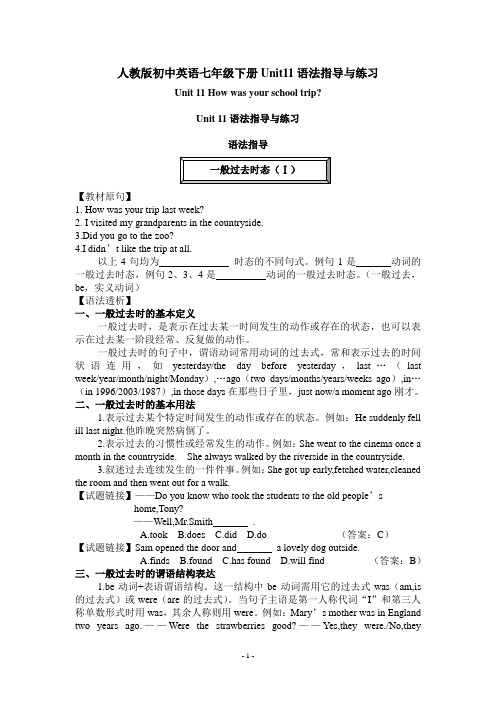
人教版初中英语七年级下册Unit11语法指导与练习Unit 11 How was your school trip?Unit 11语法指导与练习语法指导【教材原句】1. How was your trip last week?2. I visited my grandparents in the countryside.3.Did you go to the zoo?4.I didn’t like the trip at all.以上4句均为时态的不同句式。
例句1是动词的一般过去时态,例句2、3、4是动词的一般过去时态。
(一般过去,be,实义动词)【语法透析】一、一般过去时的基本定义一般过去时,是表示在过去某一时间发生的动作或存在的状态,也可以表示在过去某一阶段经常、反复做的动作。
一般过去时的句子中,谓语动词常用动词的过去式,常和表示过去的时间状语连用,如yesterday/the day before yesterday,last…(last week/year/month/night/Monday),…ago(two days/months/years/weeks ago),in…(in 1996/2003/1987),in those days在那些日子里,just now/a moment ago刚才。
二、一般过去时的基本用法1.表示过去某个特定时间发生的动作或存在的状态。
例如:He suddenly fell ill last night.他昨晚突然病倒了。
2.表示过去的习惯性或经常发生的动作。
例如:She went to the cinema once a month in the countryside. She always walked by the riverside in the countryside.3.叙述过去连续发生的一件件事。
例如:She got up early,fetched water,cleaned the room and then went out for a walk.【试题链接】——Do you know who took the students to the old people’shome,Tony?——Well,Mr.Smith .A.tookB.doesC.didD.do (答案:C)【试题链接】Sam opened the door and a lovely dog outside.A.findsB.foundC.has foundD.will find (答案:B)三、一般过去时的谓语结构表达1.be动词+表语谓语结构。
人教版英语七年级下册单元Unit 11 知识点+测试卷+思维导图
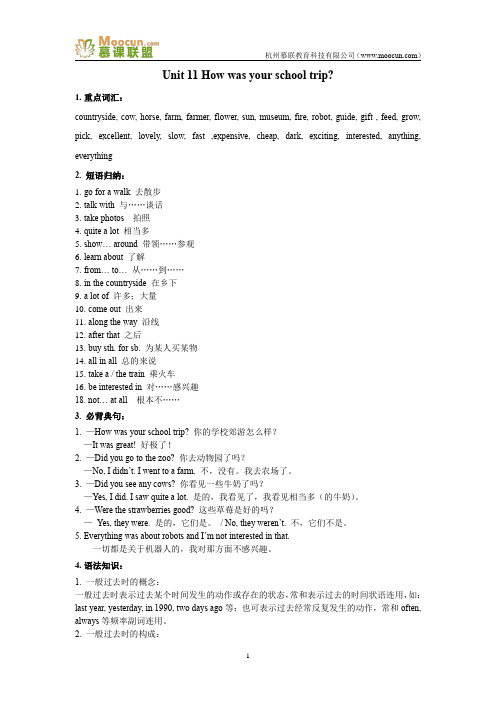
Unit 11 How was your school trip?1.重点词汇:countryside, cow, horse, farm, farmer, flower, sun, museum, fire, robot, guide, gift , feed, grow, pick, excellent, lovely, slow, fast ,expensive, cheap, dark, exciting, interested, anything, everything2. 短语归纳:1.go for a walk 去散步2.talk with 与……谈话3.take photos 拍照4.quite a lot 相当多5.show… around 带领……参观6.learn about 了解7.from… to… 从……到……8.in the countryside 在乡下9.a lot of 许多;大量e out 出来11.along the way 沿线12.after that 之后13.buy sth. for sb. 为某人买某物14.all in all 总的来说15.take a / the train 乘火车16.be interested in 对……感兴趣18. not… at all 根本不……3. 必背典句:1. —How was your school trip? 你的学校郊游怎么样?—It was great! 好极了!2. —Did you go to the zoo? 你去动物园了吗?—No, I didn’t. I went to a farm. 不,没有。
我去农场了。
3. —Did you see any cows? 你看见一些牛奶了吗?—Yes, I did. I saw quite a lot. 是的,我看见了,我看见相当多(的牛奶)。
4. —Were the strawberries good? 这些草莓是好的吗?—Yes, they were. 是的,它们是。
人教版七年级英语下册:第十一单元短语语法归纳练习含答案
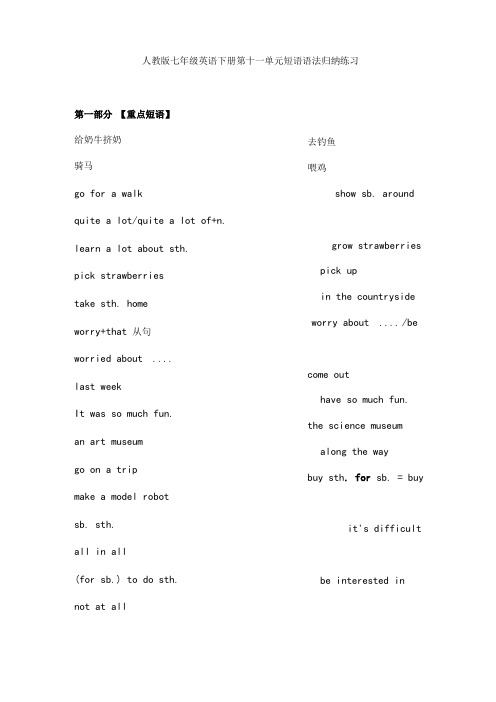
人教版七年级英语下册第十一单元短语语法归纳练习第一部分【重点短语】给奶牛挤奶骑马go for a walkquite a lot/quite a lot of+n. learn a lot about sth.pick strawberriestake sth. homeworry+that 从句worried about ....last weekIt was so much fun.an art museumgo on a tripmake a model robotsb. sth.all in all(for sb.) to do sth.not at all 去钓鱼喂鸡show sb. aroundgrow strawberries pick upin the countryside worry about .... /become outhave so much fun. the science museumalong the waybuy sth. for sb. = buyit's difficultbe interested in(doing) sth.【答案】从左至右:milk a cow; go fishing; ride a horse; feed chickens;去散步=t2卜《a walk;带领某人参观;相当多的;关于… 学到很多;种草莓;摘草莓;捡起/接某人;带…回家;在农村;担心……;担心某人某事;上周;出来/出版/开花;如此有趣;玩得非常开心;一个艺术博物馆;科学博物馆;去旅行;沿途;制作一个机器人模型;为某人买某物;总之;对某人来说做某事很困难;根本不/一点也不;对(做)…感兴趣第二部分【重点语法】一、一般过去时1.定义一般过去时表示过去某个时间或一段时间内发生的动作或状态;也可表示过去经常或反复发生的动作。
e.g.I got up at 7:00 yesterday.我昨天7 点起床。
Unit11单元知识点归纳总结及配套练习-人教版英语七年级下册

Unit11 How was your school trip?Ⅰ. Revision(复习)Ⅱ. Presentation(重点,难点,考点,热点呈现)一般过去式1. 含义:表示动作或者状态发生在过去2.构成:肯定句:主语+动词过去式+ 其它如:I went home at nine o'clock yesterday.否定句:主语+didn't +动词原形+其它如:I didn't go home yesterday. He didn't tell me about you.疑问句:一般疑问句:Did +主语+动词原形+宾语如:Did you go home yesterday?Did you study in the school?肯定回答:Yes, I did. 否定回答:No, I didn't.特殊疑问句:特殊疑问词+did +主语+动词原型+宾语When did you finish your homework last night? What did you do the day before yesterday?3. 一般过去时态动词变化形式一般过去时态由动词的过去式表示。
大多数动词的过去式是在动词原形后加上ed构成。
这类动词称为规则动词。
1)一般情况下在词尾直接加ed。
如:play―played work―worked2)以e结尾的动词只加d. 如:like--- liked love―loved3)以辅音字母+Y结尾的动词,变Y为i,再加ed. 如:study―studied carry―carried 4)以重读闭音节结尾的动词,如果末尾只有一个辅音字母,要双写最后这个辅音字母,再加ed.如:stop―stopped5)不以ed 结尾的过去式,称为不规则动词,如:write --wrote go-went do-did have-had see-saw take-took make-made come-came buy-bought4. 标志词。
人教版初一七年级英语(下)第十一单元Unit11知识点、语法+练习题、测试
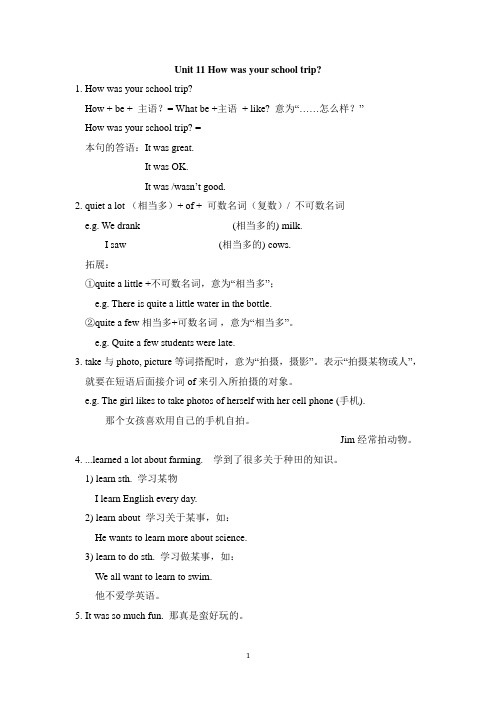
Unit 11 How was your school trip?1. How was your school trip?How + be + 主语?= What be +主语+ like? 意为“……怎么样?”How was your school trip? = __________________________________本句的答语:It was great. _________________It was OK. _________________It was /wasn’t good. _________________2. quiet a lot (相当多)+ of + 可数名词(复数)/ 不可数名词e.g. We drank __________________(相当多的) milk.I saw __________________(相当多的) cows.拓展:①quite a little +不可数名词,意为“相当多”;e.g. There is quite a little water in the bottle.②quite a few 相当多+可数名词,意为“相当多”。
e.g. Quite a few students were late.3. take与photo, picture等词搭配时,意为“拍摄,摄影”。
表示“拍摄某物或人”,就要在短语后面接介词of来引入所拍摄的对象。
e.g. The girl likes to take photos of herself with her cell phone (手机).那个女孩喜欢用自己的手机自拍。
______________________________________________ Jim经常拍动物。
4. ...learned a lot about farming. 学到了很多关于种田的知识。
1) learn sth. 学习某物I learn English every day.2) learn about 学习关于某事,如:He wants to learn more about science.3) learn to do sth. 学习做某事,如:We all want to learn to swim.他不爱学英语。
2020年人教版七年级英语下册第十一单元短语语法归纳练习含答案
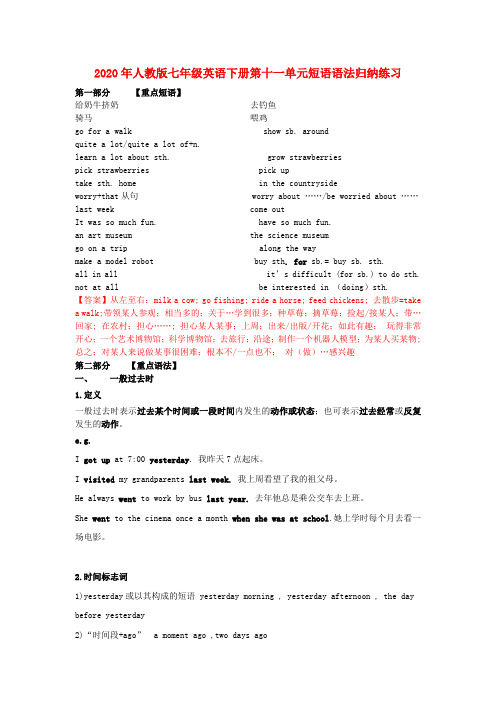
2020年人教版七年级英语下册第十一单元短语语法归纳练习第一部分【重点短语】给奶牛挤奶去钓鱼骑马喂鸡go for a walk show sb. aroundquite a lot/quite a lot of+n.learn a lot about sth. grow strawberriespick strawberries pick uptake sth. home in the countrysideworry+that从句worry about ……/be worried about ……last week come out It was so much fun. have so much fun. an art museum the science museumgo on a trip along the waymake a model robot buy sth. for sb.= buy sb. sth.all in all it’s difficult (for sb.) to do sth. not at all be interested in (doing)sth.【答案】从左至右:milk a cow; go fishing; ride a horse; feed chickens; 去散步=take a walk;带领某人参观;相当多的;关于…学到很多;种草莓;摘草莓;捡起/接某人;带…回家; 在农村;担心……; 担心某人某事;上周;出来/出版/开花;如此有趣;玩得非常开心;一个艺术博物馆;科学博物馆;去旅行;沿途;制作一个机器人模型;为某人买某物;总之;对某人来说做某事很困难;根本不/一点也不;对(做)…感兴趣第二部分【重点语法】一、一般过去时1.定义一般过去时表示过去某个时间或一段时间内发生的动作或状态;也可表示过去经常或反复发生的动作。
e.g.I got up at 7:00 yesterday. 我昨天7点起床。
人教版七年级下册英语Unit 11 知识点语法归纳总结

Unit 11 How was your school trip?1.短语归纳2.典句必背3.用法集萃(1)I saw quite a lot. 我看到了很多。
❖quite a lot表示“许多”,若表示“许多....(人或物)”要用quite a lot of... 的搭配。
例:I ate quite a lot last night. And I didn't feel well. 昨天晚上我吃了许多。
我觉得不舒服。
We saw quite a lot of sheep in the village. 我们在那个村庄里看到了许多绵羊。
(2)But I milked a cow. 但是我给一头奶牛挤奶。
❖milk 作名词,意为“牛奶”,是不可数名词。
例:I’d like a cup of milk. 我想要杯牛奶。
❖milk 作动词,意为“挤奶”。
例:I helped the farmer (to) milk the cow. 我帮助农民挤奶。
(3)Carol picked some strawberries and took them home.卡萝尔摘了一些草莓并且把它们带回了家。
❖pick用作动词,有“采;摘”之意。
此时是及物动词,宾语通常是花或果实等。
例:She went to the garden and picked some strawberries. 她去花园摘了一-些草莓。
❖拓展pick up是固定搭配,意为“捡起;拾起”,它的宾语有两种形式:(4)And I fed the chickens with my grandpa. 我还和我爷爷起喂鸡了。
❖feed作动词,意为“喂养;饲养”,它的过去式是fed。
例:Yesterday I went to the farm and fed chickens there. 昨天我去了农场并且在那里喂鸡了。
(5)But at about two o’clock, it got very cloudy and we worried it would rain.但是在大约两点时,天气变得多云了,我们担心会下雨。
人教版丨七年级下册英语11单元重点句型解析(附练习题及答案)
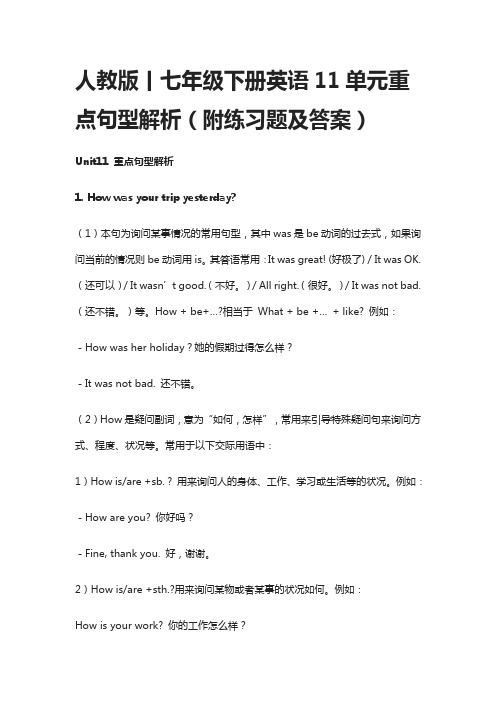
人教版丨七年级下册英语11单元重点句型解析(附练习题及答案)Unit11 重点句型解析1. How was your trip yesterday?(1)本句为询问某事情况的常用句型,其中was是be动词的过去式,如果询问当前的情况则be动词用is。
其答语常用:It was great! (好极了) / It was OK.(还可以)/ It wasn’t good.(不好。
)/ All right.(很好。
)/ It was not bad.(还不错。
)等。
How + be+…?相当于What + be +…+ like? 例如:-How was her holiday?她的假期过得怎么样?-It was not bad. 还不错。
(2)How是疑问副词,意为“如何,怎样”,常用来引导特殊疑问句来询问方式、程度、状况等。
常用于以下交际用语中:1)How is/are +sb. ? 用来询问人的身体、工作、学习或生活等的状况。
例如:-How are you? 你好吗?-Fine, thank you. 好,谢谢。
2)How is/are +sth.?用来询问某物或者某事的状况如何。
例如:How is your work? 你的工作怎么样?3)How do you do? 并不表示疑问,是第一次见面时的问候语,回答仍用此句。
例如:How do you do? 你好!How do you do? 你好!4)How is it going?/ How is everything going? 用来询问事情进展如何。
例如:How is it going? 情况/进展如何?Very well./ Not too bad./just so so.很好。
/还不坏。
/一般吧。
2. Did you see any cows?此句是一个一般过去时的一般疑问句,用于询问过去发生的动作或事情。
句式是“Did+主语+动词原形+其他成分?”。
人教版英语七年级下册第十一单元短语语法知识点总结

Unit 11How was your schooltrip?【短语归纳】1. go for a walk去散步2. milk a cow 挤牛奶3. ride a horse 骑马4. feed chickens 喂小鸡5. talk with与…谈话6. take photos拍照7. quite a lot相当多8. show...around带领...参观9. learn about 了解10. from... to... 从...到... 11. grow/pick strawberries 种植/采草莓13. in the countryside在乡下14. go fishing去钓鱼15. at night在夜晚16. a lot of许多;大量17. come out出来18. go on a school trip去学校郊游19. along the way沿线20. after that之后21. buy sth. for sb. 为某人买某物22. all in all 总的来说23. take a / the train 乘火车24. be interested in 对……感兴趣25. not… at all 根本不……【用法集萃】1. How + be…? + like? ……怎么样?2. too many + 可数名词复数太多的……3. teach sb. how to do sth. 教某人怎样做某事4. quite + a / an + 形容词+可数名词单数= a + very + 形容词一个相当/ 很……┃语法探究┃一般过去时态Ⅰ定义:表示__________某个时间或某一段时间内发生的动作或存在的状态。
时间状语:______________ (昨天),___________(去年), ________________(三天前),_______________________ (刚才), ______________ (在2000年)等。
新人教七年级下册英语unit 11重点语法讲解及练习(无答案)
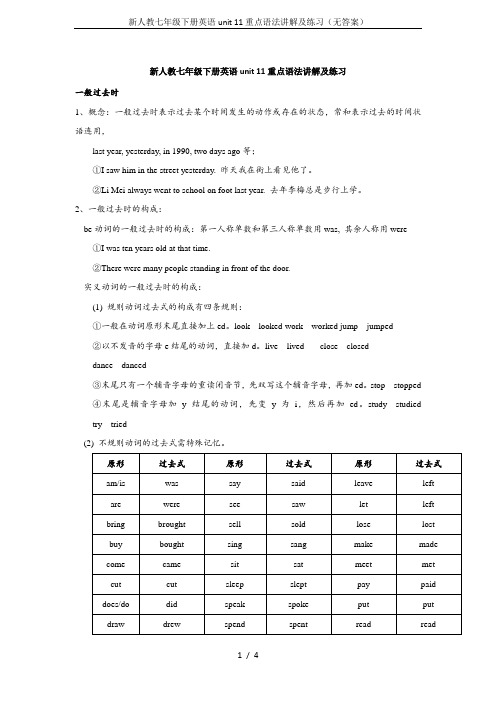
新人教七年级下册英语unit 11重点语法讲解及练习一般过去时1、概念:一般过去时表示过去某个时间发生的动作或存在的状态,常和表示过去的时间状语连用,last year, yesterday, in 1990, two days ago等;①I saw him in the street yesterday. 昨天我在街上看见他了。
②Li Mei always went to school on foot last year. 去年李梅总是步行上学。
2、一般过去时的构成:be动词的一般过去时的构成:第一人称单数和第三人称单数用was, 其余人称用were①I was ten years old at that time.②There were many people standing in front of the door.实义动词的一般过去时的构成:(1) 规则动词过去式的构成有四条规则:①一般在动词原形末尾直接加上ed。
look---looked work---worked jump---jumped②以不发音的字母e结尾的动词,直接加d。
live---lived close---closeddance---danced③末尾只有一个辅音字母的重读闭音节,先双写这个辅音字母,再加ed。
stop---stopped④末尾是辅音字母加y结尾的动词,先变y为i,然后再加ed。
study---studiedtry---tried(2) 不规则动词的过去式需特殊记忆。
3、一般过去时的几种句型:(1) be动词的一般过去时的句型:①肯定句结构为:主语+was / were+其它。
I was at home yesterday. They were really happy at the party.②否定句结构为:主语+was not (wasn’t) /were not (weren’t)+其它。
I wasn’t at home yesterday.They weren’t happy at the party.③一般疑问句结构为:Was / Were+主语+其它?---Were you at home yesterday? ---Yes, I was. / No, I wasn’t.---Were they happy at the party? ---Yes, they were. / No, they weren’t.④特殊疑问句结构为:疑问词+was / were+主语+其它?---Where were you last night? ---We were at my uncle’s house.---How was your weekend? ---It was great.(2) 实义动词的一般过去时的句型:①肯定句结构为:主语+动词的过去式+其它。
人教版英语七下_Unit 11 重点语法链接教材精准变式练(解析版)

Unit11 How was your school trip ?教材重点语法知识链接及典例解读一般过去时(1)【教材原句】①-Did you go to the zoo?你去动物园了吗?-No,I didn't. I went to a farm.不,我没有。
我去了一个农场。
①-Did Carol ride a horse?卡萝尔骑马了吗?-No,she didn't. But she milked a cow.不,她没有。
但她给一头奶牛挤奶了。
①-Were the strawberries good?草莓好吃吗?-Yes,they were./No,they weren't.是的,它们好吃。
/不,它们不好吃。
1.动词过去式(1)动词过去式的规则变化如下:Note:-(e)d在清辅音后面一般读作/t/;在浊辅音和元音后面一般读/d/;在/t/和/d/后面一般读/Id/.(2)动词的过去式的不规则变化可大致分为以下几类:①过去式与原形同形,如:cut,hurt(使受伤),let,put,read.①把i变为a,如:begin-began;sit-sat;give-gave;swim-swam;sing-sang.①过去式以-aught/-ought 结尾,如:buy-bought;catch-caught;teach-taught;think-thought.①中间去e末尾加t,如:feel-felt;keep-kept;sleep-slept.①把i变为o,如:ride-rode;drive-drove;write-wrote.①ow/aw 变为ew,如:draw-drew;know-knew;grow-grew;throw-threw(扔)。
①以-end结尾的词,变d为t,如:lend-lent(借出);spend-spent.2.一般过去时的句式结构主要包括含be 动词和实义动词的两种句式类型。
- 1、下载文档前请自行甄别文档内容的完整性,平台不提供额外的编辑、内容补充、找答案等附加服务。
- 2、"仅部分预览"的文档,不可在线预览部分如存在完整性等问题,可反馈申请退款(可完整预览的文档不适用该条件!)。
- 3、如文档侵犯您的权益,请联系客服反馈,我们会尽快为您处理(人工客服工作时间:9:00-18:30)。
人教版七年级英语下册第十一单元短语语法归纳练习第一部分【重点短语】给奶牛挤奶去钓鱼骑马喂鸡go for a walk show sb. aroundquite a lot/quite a lot of+n.learn a lot about sth. growstrawberriespick strawberries pick uptake sth. home in the countrysideworry+that从句worry about ……/beworried about ……last week come out It was so much fun. have so much fun. an art museum the science museumgo on a trip along the waymake a model robot buy sth. for sb.=buy sb. sth.all in all it’s difficult(for sb.) to do sth.not at all be interested in(doing)sth.【答案】从左至右:milk a cow; go fishing; ride a horse; feed chickens; 去散步=take a walk;带领某人参观;相当多的;关于…学到很多;种草莓;摘草莓;捡起/接某人;带…回家; 在农村;担心……; 担心某人某事;上周;出来/出版/开花;如此有趣;玩得非常开心;一个艺术博物馆;科学博物馆;去旅行;沿途;制作一个机器人模型;为某人买某物;总之;对某人来说做某事很困难;根本不/一点也不;对(做)…感兴趣第二部分【重点语法】一、一般过去时1.定义一般过去时表示过去某个时间或一段时间内发生的动作或状态;也可表示过去经常或反复发生的动作。
e.g.I got up at 7:00 yesterday. 我昨天7点起床。
I visited my grandparents last week.我上周看望了我的祖父母。
He always went to work by bus last year.去年他总是乘公交车去上班。
She went to the cinema once a month when she was at school.她上学时每个月去看一场电影。
2.时间标志词1)yesterday或以其构成的短语 yesterday morning , yesterday afternoon , the day before yesterday2)“时间段+ago” a moment ago ,two days ago3)“last +时间名词” last night / year / week ,4)in 1999, in the past , at that time, just now 等3.一般现在时的结构及句型变化结构:一般现在时的结构主要有三种形式:(1) 谓语动词为be动词时肯定句:主语 + was/were + 其它.否定句:主语 + was/were + not +其它(was not=wasn’t were not=weren’t)一般疑问句:was/were +主语+其它e.g.I was late yesterday. They were in China last year.I was not late yesterday. They weren’t in China last year.Were you late yesterday?Were they in China last year?肯定回答:Yes, I was. Yes, theywere.否定回答: No, I wasn't. No, theyweren’t缩写形式:was not=wasn’t; were not= ;【注意】she was可以缩写吗?They were可以缩写吗?(2) 谓语动词为实义动词时肯定句:主语+动词过去式+其它. Li Ming studiedEnglish this morning.否定句:主语+ didn’t +动词原形+其它. Li Ming didn'tstudy English this morning.一般疑问句:Did+主语+动词原形+其它. Did Li Ming studyEnglish this morning?肯定回答: Yes, he did.否定回答: No, he didn't.【注意】1.谓语动词为实义动词时,变否定句和一般疑问句都找助动词did来帮忙(过去时不分人称和单复数,都是加did或didnot)2.前面出现了助动词,后面的动词一律用原形。
(还原)3.变一般疑问句时,一问一答的关系当中,第一人称和第二人称要互换。
【练习】改写句子1、There was a car in front of the house just now.否定句:___________________________________________一般疑问句:_______________________________________肯定回答:_________________________________________否定回答:_________________________________________2 They played football on the playground yesterday afternoon.否定句:__________________________________________一般疑问句:______________________________________肯定回答:________________________________________否定回答:________________________________________【了解】谓语动词为情态动词时:(情态动词 can ,may ,have to 等等。
)肯定句:主语+情态动词过去式+动词原形+其它The old man could swim 30 years ago.否定句:主语+情态动词过去式+not+动词原形+其它The old man couldn’t swim 30 years ago.一般疑问句:情态动词过去式+主语+动词原形+其它Could the old man swim 30 years ago?肯定回答:Yes, he could.否定回答:No, he couldn’t.常用情态动词过去式如下:can—could may―might shall―should will―would5.一般过去时的特殊疑问句:◆特殊疑问词+did+主语+动词原形+其它? What did Jimdo yesterday?◆特殊疑问词+was/were+主语+其它? Who was yoursister?练习:对划线部分提问1. My mother did her housework at home last night.did your mother do her housework last night?2. They played Ping-Pong with Tom.did they play Ping-Pong with?6、动词的过去式动词过去式构成:分为规则动词和不规则动词。
①规则动词:②:不规则动词:详见课本P141“不规则动词表”go---went take----took ride----rode feed----fed see---sawgrow---grew have/has---had get---got come---came think---thoughteat----ate fly-flew【注意】一些动词的过去式跟原形一样:比如:put---put cut----cut let---let read---read等【课堂练习】一、写出下列动词的过去式二、用适当形式填空。
1.They____(be)on the farm a moment ago.2. There____(be)at a shop not long ago.3.Jenny____(not go)to bed until11:00o'clock last night.4.Danny_____(read)English five minutes ago.5.I_____(see)Li Lei go out just now.6.He____(do)his homework every day.7.When I was young,I____ (play)games with my friends.8.When____you_____ (write)this book?I _____it last year.9.Did he____ (have)lunch at home?10.I_____ (eat)the bread,I'm full now.【答案】we re; were; didn’t go; read; saw; did; played; did write wrote; have; ate【综合练习】一、单项选择:1.She lived there before he____to ChinaA.cameeseing2.When did you____here?A. got toB.reachedC.arrived inD.reach3. John and I to visit his grandparents last Sundayafternoon. (重2017B)A. goB. wentC. will goD. goes4. -Why didn’t you buy any bread? (重2015B)-Sorry, I .A. forgotB. forgetC. rememberD.remembered二、完成句子1. They didn’t arrive on time because they got up late. 对划线部分提问 (重2017A)______ ______they arrive on time?2. The girl bought lots of clothes on the day of Double 11 last year.对划线部分提问(重2016B)____________the girl do on the day of Double 11 last year?3. Lin Li cooked for her parents on Sundays. 对划线部分提问 Lin Li for her parents?【答案】ADBA; Why did; What did; When did cook二、重点句型短语1. Did you learn anything? “你学到了什么东西?”anything“一些,某些”,常用于否定句及疑问句。
